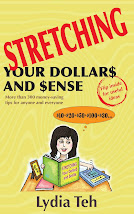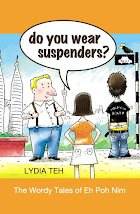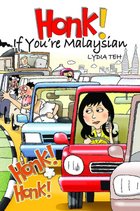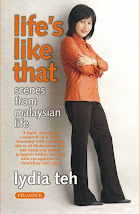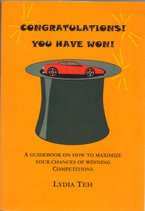The KLILF was spread out over a three day period, 28-30 March 2007 in Bangsar. The sessions I attended were held at Starbucks in Bangsar Shopping Village and Alexis Bistro. Hats off to Raman and his team at Silverfish Books for thinking out of the box and holding the events at these places. I enjoyed the talks and more so, the networking. It was a pleasure meeting with familiar names as well as lurkers at my blog. I could only attend the morning sessions and one-and-half afternoon ones as I had to rush back to round up the kids.

Eric, me and Tash Aw

Shannon Shah in conversation with Randa Abdel-Fattah

Kak Teh, Mariatini,
Anedra and me

Azmi Talib, me, Raja Ahmad, Gerald Chuah and Kak Teh

Eddin Khoo with Brian Castro

Me, Helen Ann Peters, DK Hansra and Georgette Tan
Tash Aw’s Beginnings WorkshopIt reminded me of Critical Appreciation during English Lit classes. Tash had us read some opening and ending passages from classics such as Emma, Farewell to Arms and Lolita.
He asked questions such as : What sort of mood was conjured? What are the images used? How about the choice of words?
Some of the things he shared with us :
You must have an arresting beginning. You have to drag the reader from the threshold into your world.
In Emma, this was the opening para : “Emma Woodhouse, handsome, clever, and rich, with a comfortable home and happy disposition, seemed to united some of the best blessings of existence; and had lived nearly twenty-one years in the world with very little to distress or vex her.”
I asked if we shouldn’t be showing rather than telling as in Emma’s opening. His reply : “Disregard rules. Do what works for you.” He loves adjectives. He is particularly enamoured with the choice of adjectives used in the first line. You couldn’t rearrange the words any other way without losing the cadence.
He then asked us to write the opening paragraph for this story: Razak is an ambitious guy who has his eyes on the CEO’s job. His wife, Amy, is beautiful and pushy. One day they invited the CEO, Tony, to their Kenny Hills home. They killed him and got rid of the body. Razak is tortured by his conscience and Amy becomes cranky. (For the more discerning participants, Macbeth quickly sprang to mind.)
He asked us to bear these in mind :
1. The opening must be representative of the rest of the novel – epic or intimate or humourous etc.
2. Give information while creating questions.
3. Drag the readers across the threshold into your novel.
The audience was very participative with dozens of hands shooting up when he asked for volunteers to read their pieces. I didn’t get to read out my passage. Here it is :
I see him in my dreams. He’s wearing his favourite bush jacket, the gold buttons gleaming like jewels in the sun. His hands are outstretched, as if he’s about to grab my hands and pump it vigorously. I extend my hands but he grabs my neck. I feel his fingers tightening.Endings WorkshopWriters don’t often know how to end their novels because there are too many endings in mind.
Tash doesn’t like a neat Hollywood style ending. He prefers a fudged ending (as can be seen in Harmony Silk Factory).
We read and analyzed the ending passages of Farewell to Arms and Lolita. Then we did the ending for our story which had Razak meeting a sticky end and Amy committing suicide.
A young lady got up to read her piece.
“I’m experimenting with something,” she said. “I used the same image of the house in the beginning for the end too.”
Well, it turned out that quite a few of us experimented with the same concept. Another participant used the image of a spider’s web to represent entanglement both at the start and end.
I remember that was what Anne Tyler did in The Accidental Tourist where the novel opened with the protagonist in the car and ended with him in the taxi. If I’m not mistaken, in The Weekend Novelist, Robert Ray wrote of that as “framing.” Apparently there’s a name for it : elliptical ending.
Here’s mine :
I see her in my dreams. She’s dressed in a long flowing white gown, like a bride. She beckons to me with open arms. I want to embrace her but when I draw nearer, she vanishes. She has abandoned me and left me to face the harsh reality of cold prison walls.When asked how he would write the novel, Tash said he would make it a first person narrative from Razak’s point of view and show his descent into madness. He would fudge the ending, suggesting a parallel in an oblique way.
Randa's Talk on moderate Muslim voices in the mainstream narrativeRanda’s book, Does My Head Look Big In This is about Amal, an Australian-Palestinian Muslim girl who decided to wear the hijab full time. In writing the book, Randa created a diverse range of Muslims as she didn’t want to moralize that those who wear the hijab are more pious or better than those who don’t.
Unfortunately I had to leave early to pick up the kids. On the way out, I bumped into
Kak Teh who was buying Randa’s book and on seeing my hesitation when she asked if I was getting it too, she immediately offered to buy me one. Kak Teh, terima kasih. I’ve started on a few pages and it’s very good. I’ve passed it to my daughter to read first as I think it’s just up her alley.
Brian Castro's Talk on how family history can be used to create literatureBrian’s book Shanghai Dancing is based loosely on his family’s life in Shanghai, Hong Kong and Macau from the 1930s to 1960s. Some of the things he said :
- Shanghai Dancing is a fictional autobiography. For a writer, an autobiography is inventing himself, unlike say, an autobiography for a Prime Minister based on facts.
- In writing, it’s not truth you’re after. It’s the psychological truth. As a writer, you’re an inventor, a liar.
- When he was a child, he used to hide under the table and listened to the goings-on from there. He got the idea that his mother was good for truth, and his father good for invention. When she died, he decided that he has to invent the truth.
- He wouldn’t have been able to write the book were his parents still alive. His siblings are still alive but he changed their names in the book. He didn’t ask their permission to write about them as he wasn’t in touch with them. “Forget about the legal implications, I have no money anyway.”
- Readers today want something short. They have no time to appreciate language.
- If you have interesting things happening to you, that doesn’t mean they’ll be interesting to others. There must be a shape to it. You have to make it interesting to them.
I wanted to ask how to derive this ‘shape’ but I didn’t as I didn’t think he could give me a satisfactory answer given the time constrain. That’s my problem. I’ve got a bunch of narratives gleaned from the family closet but they’re all over the place like an amoeba.



























































